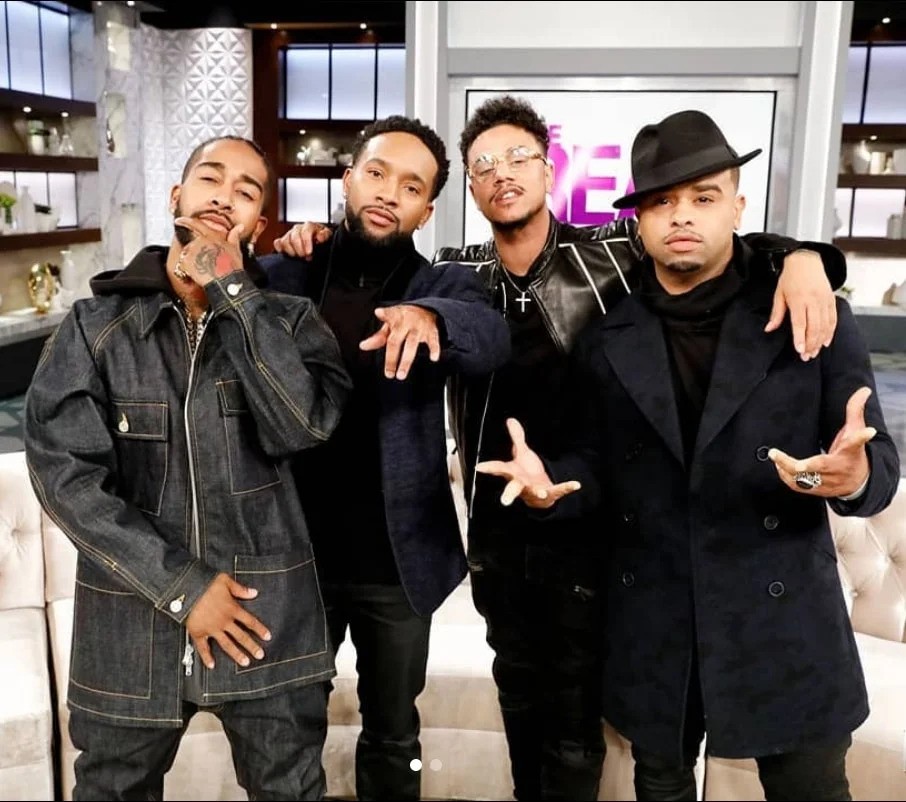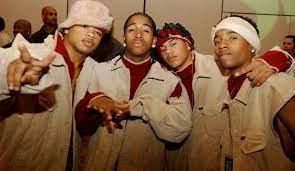B2K recently appeared on Drink Champs and didn’t hold back, claiming that Omarion was the root cause of their group’s downfall. The statement caused quite a stir, with many wondering about the details behind the scenes. Meanwhile, Omarion shared his perspective in an exclusive documentary, promising to shed light on the matter.
To provide some context, let’s delve into the ongoing drama within B2K. On the Impressive Channel, we’re diving into the recent revelations made by three B2K members—Jbug, Rasberry, and Fizz—during their appearance on Drink Champs. They opened up about their frustrations with former bandmate Omarion, particularly regarding his comments during a Versus battle with Mario.
Prior to the Versus battle, tensions escalated when Omarion made a seemingly dismissive remark in The Shade Room’s comment section. Responding to a question about whether B2K would be part of the performance, Omarion replied, “I am B2K,” and even claimed credit for the majority of the group’s vocals. This assertion stirred controversy, as it appeared to undermine the contributions of other members.
During the battle, when Omarion dipped into the B2K catalog, his bandmates sensed his nervousness. His attempt to downplay their significance by asserting ownership over the vocals only added fuel to the fire. The tension escalated further when references were made to “Little Steve” and playful jabs about Omarion’s attire and apparent inebriation.

These recent events have reignited interest in the dynamics within B2K and raised questions about the truth behind their breakup. Omarion’s upcoming documentary promises to provide insight into his side of the story, offering a deeper understanding of the conflicts within the group. Stay tuned as we unravel the complexities of this ongoing saga.
This Versus battle still cracks me up every time I think about it. Anyway, tensions arose within B2K when Omarion claimed he sang all of the songs. While it’s true that Omarion handled lead vocals on most tracks, he didn’t cover everything. B2K took offense at this assertion, throwing shade by likening him to David Ruffin from The Temptations, a notorious diva. In retaliation, Omarion dubbed them his background dancers, accusing them of jealousy and suggesting they find other employment.
Omarion shared his perspective on the matter in his documentary, ‘The Gift and the Curse,’ shedding light on why he distances himself from his former group members. Conversely, B2K recounted their version of events on Drink Champs, revealing details not previously known. During the early 2000s, B2K soared to the top as the premier black boy band of the era. However, their reign was brief, with the group disbanding after just four years.
The root cause of their breakup, as B2K explained, was their management. They discovered they were toiling away without reaping financial rewards, even after successful ventures like the Scream Tour. Their manager, Chris Stokes, was living lavishly off their earnings, prompting them to clandestinely plan his removal post-tour. Unfortunately, their scheme failed when Omarion betrayed their trust.
Initially, Omarion’s motive for snitching remained unclear. However, it later emerged that his actions stemmed from purported jealousy over Fizz’s romantic involvement with a girl Omarion fancied. This revelation sheds new light on the dynamics within the group during their tumultuous tour experiences. Despite their plans to unite and secure their financial future, internal conflicts and personal grievances ultimately led to their downfall.

Upon our return, we found ourselves gathered in a makeshift meeting space, nothing but dirt beneath our feet. As we stepped out of the car, management stood before us, forming a half-circle. Their demeanor was tense. “You ready to begin?” they asked, almost challenging us. Then came the bombshell: “B2K is over,” they declared flatly. It hit me hard. All they wanted from us now was to finish recording the remaining tracks for the ‘You Got Served’ soundtrack and shoot the accompanying videos. No more, no less. It was clear they were aware of our desire to part ways, to break free from our contractual obligations and pursue our own paths. I felt betrayed. Who had spilled our secrets? It was management themselves. They had divulged our plans, leaving us exposed and vulnerable.
After completing our obligations for ‘You Got Served,’ there was nothing left for us. We were effectively sidelined, unable to make any moves due to contractual constraints. It felt like we were trapped. And the frustration grew when blame was unfairly placed on some of us for incidents beyond our control.
Looking back, I realized the signs were there all along. During discussions about breaking away from management, their focus kept circling back to the allure of solo careers, emphasizing the potential for greater financial gain. They painted a tempting picture, citing examples like Bobby Brown’s success as a solo artist. But in hindsight, I regret opening up about our plans to leave. That confidential conversation became a weapon against us.
I stand by the choices we made as B2K, except for that one moment of trust misplaced. Had we kept our intentions hidden, perhaps the group would still be intact today.

So, here’s the narrative behind B2K’s breakup, with Nori offering an insightful perspective that resonates with me. It seems that internal tensions within the group stemmed, in part, from a rivalry between Omarion and Lil Fizz. Fizz claims he never saw Omarion as competition or felt envious of him, but the situation becomes murky when he pursues girls Omarion has shown interest in or dated. This dynamic suggests an underlying sense of competition and perhaps jealousy between them.
Likewise, Omarion likely felt pressure to vie for attention alongside Fizz and Jay Boog, who were fan favorites despite Omarion’s role as the lead singer and primary performer. Even as Omarion led the group and put in considerable effort, he had to contend with the others for recognition. When Fizz and Jay Boog began taking on more prominent roles, it intensified the competition within the group, leading to further strain.
Ultimately, this internal rivalry took its toll. While all members were recognized in their own right, each with their own fan base, tensions escalated. Omarion hints at this competitive atmosphere, suggesting that popularity among fans was evident in various ways, such as merchandise sales and fan interactions. The pressure to outshine one another, coupled with label pressures, likely exacerbated the conflicts within the group, ultimately contributing to its dissolution.
During the first week, they tallied up album sales to see whose was the highest. And the money? Yeah, we won’t delve into the specifics. But that’s the perspective: one, two, and then four, yeah. That’s the reality, if we’re being honest. Oh, definitely. He always wanted to outshine all three of us, you know? Because he sang the lead on the record. You catch my drift? He was the one upfront. You’re starting to lose your grip on the one thing you valued most, because you didn’t value the other things you truly desired. So, when you realize, “I’m losing the game I want to play,” the only option is to break away.
